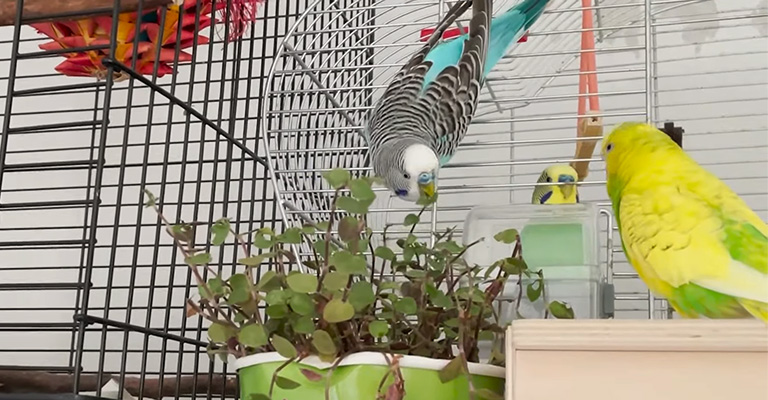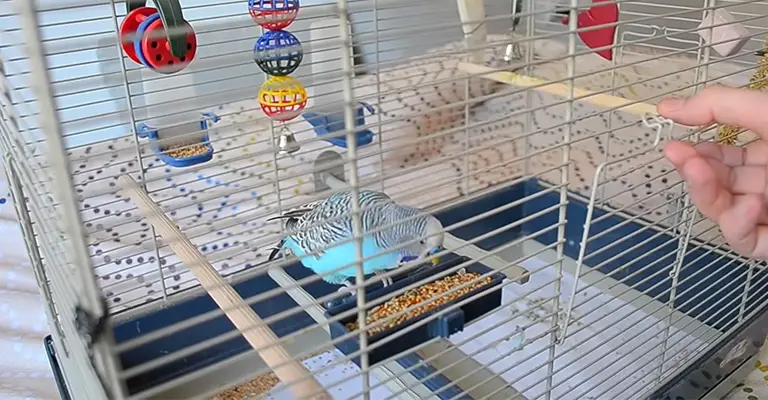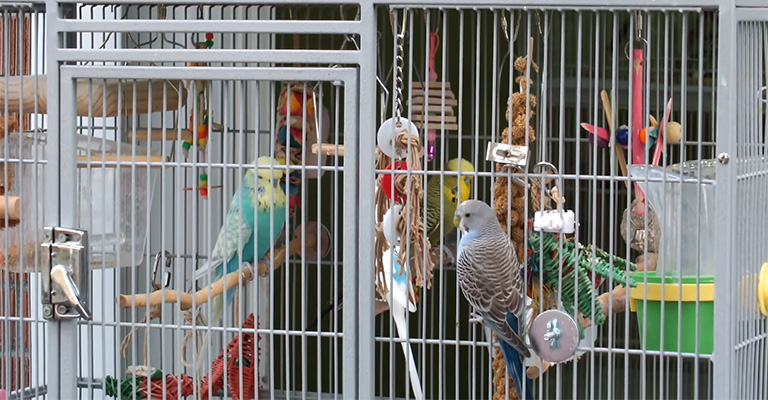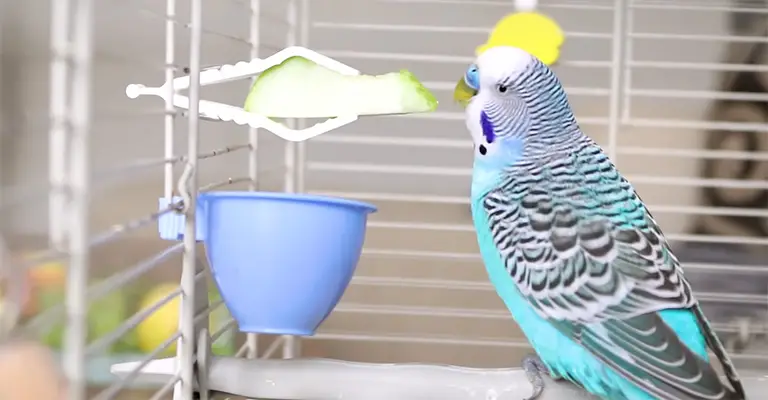The world of avian companionship is a delicate balance between providing safety and promoting a fulfilling life for our feathered friends.
The question of whether can I keep a budgie permanently in a cage encapsulates this balance, inviting us to explore the implications of such a decision.
While cages offer protection and a controlled environment, the effects of confinement on a budgie’s physical and mental well-being raise critical considerations.
This inquiry delves into the multifaceted aspects of this choice, examining both the advantages and potential drawbacks.
By understanding the dynamics of cage confinement and its impact on aspects like exercise, socialization, and overall happiness, we can navigate the path to responsible avian care with greater insight and empathy.

Can I Keep A Budgie Permanently In A Cage?
Keeping a budgie permanently in a cage can have various effects on their well-being, both positive and negative. It’s important to carefully consider these factors before making a decision.
Here are some effects of keeping a budgie in a cage:
Limited Flight Space
Confinement in a cage restricts a budgie’s ability to fly and exercise. This can lead to reduced muscle development and potentially contribute to obesity or other health issues. Providing supervised out-of-cage time is crucial to promote physical activity.
Mental Stimulation
A cage-bound budgie might experience boredom and a lack of mental stimulation. This can result in behaviors like feather plucking or excessive vocalization.
Providing toys, perches, and interactive activities in the cage helps keep their minds engaged.
Social Isolation
Budgies are social birds that thrive on interaction. Isolating them in a cage without companionship can lead to loneliness and behavioral problems.
Having at least one same-species companion or regular human interaction is important for their social well-being.
Stress and Agitation
Continuous confinement might induce stress and restlessness in budgies. Without the ability to engage in natural behaviors like flying and exploration, they might become agitated and frustrated.
Health Concerns
Inadequate space can contribute to poor air circulation, which might increase the risk of respiratory issues. Also, limited exposure to natural light can impact their circadian rhythms and overall health.
Feather and Skin Problems
Constant contact with cage bars or perches can lead to feather and skin problems, including feather abrasion or pressure sores.
Dependence on Cage
Budgies kept solely in cages might become overly reliant on the confined environment, inhibiting their ability to adapt to new situations or environments.
Longevity and Happiness
A budgie’s lifespan and overall happiness can be affected by living solely in a cage. Proper care, enrichment, and a spacious environment contribute to their longevity and well-being.
Quality of Life
While cages are necessary for safety, using them as the sole living space can impact a budgie’s quality of life.
Providing a spacious aviary or designated play area allows them to experience more natural behaviors and enhances their overall happiness.
While cages provide a safe environment, keeping a budgie permanently confined can have negative consequences on their physical and mental health.
Striking a balance between providing a secure cage and allowing regular out-of-cage time for exercise, socialization, and mental stimulation is crucial for their well-being and happiness.
What Would It Cause If I Kept A Budgie Permanently In A Cage?

Keeping a budgie permanently in a cage can cause many health problems for your bird.
Some of the possible symptoms are:
Obesity And Diabetes
If your budgie does not get enough exercise and movement, it can gain excess weight and fat, which can affect its metabolism and insulin production.
This can lead to obesity and diabetes, which can cause various complications, such as heart disease, liver disease, or respiratory issues.
Muscle Atrophy And Cardiovascular Problems
If your budgie does not use its muscles and wings regularly, it can lose its muscle mass and strength, which can affect its mobility and balance.
This can also reduce blood circulation and oxygen delivery, which can affect heart and lung function.
Respiratory Infections And Feather Plucking
If your budgie is exposed to poor ventilation, hygiene, or lighting in its cage, it can inhale dust, dirt, or mold, which can irritate its respiratory system and cause infections or inflammation.
It can also damage its feathers and skin, which can cause it to pluck or chew on its feathers to relieve the discomfort.
Eye Problems And Vitamin D Deficiency
If your budgie does not get enough natural sunlight in its cage, it can affect its vision and eye health.
It can also affect its vitamin D synthesis and calcium metabolism, which are essential for its bone and feather growth and development.
Boredom, Frustration, Or Depression
If your budgie does not get enough mental stimulation and enrichment in its cage, it can feel bored, frustrated, or depressed.
It can lose its interest in food, water, or toys and become inactive or lethargic. It can also develop behavioral problems, such as aggression, screaming, or self-mutilation.
Loneliness, Anxiety, Or Fear
If your budgie is isolated from other birds or humans in its cage, it can feel lonely, anxious, or fearful.
It can become more timid or shy and avoid any contact or interaction with you or other birds. It can also become more stressed or nervous and show signs of panic or distress.
Impaired Cognitive And Learning Abilities
If your budgie does not get enough socialization and interaction in its cage, it can affect its cognitive and learning abilities.
It can have trouble remembering, solving problems, or communicating with you or other birds. It can also have difficulty bonding or cooperating with you or other birds.
How Long Does a Budgie Live in a Cage?

The lifespan of a budgie in a cage depends on many factors, such as its diet, health, care, and environment. However, on average, a budgie can live for about 10 to 15 years in captivity.
Here are some of the stages of a budgie’s life in a cage:
Baby Stage
This is the stage from hatching to weaning, which usually lasts for about 6 to 8 weeks. During this stage, the baby budgie is blind and helpless and relies on its parents for warmth and food.
The baby budgie gradually develops its feathers, eyesight, and hearing and learns to perch, fly, and eat on its own.
Juvenile Stage
This is the stage from weaning to maturity, which usually lasts for about 4 to 6 months. During this stage, the juvenile budgie is curious and playful and explores its surroundings and toys.
The juvenile budgie also learns to communicate and socialize with other birds or humans and develops its personality and preferences.
Adult Stage
This is the stage from maturity to old age, which usually lasts for about 9 to 14 years. During this stage, the adult budgie is fully grown and has its distinctive colors and markings.
The adult budgie also reaches its sexual maturity and may show signs of breeding behavior, such as courting, nesting, or laying eggs.
Old Age Stage
This is the final stage of a budgie’s life in a cage, which usually lasts for about 1 to 2 years.
During this stage, the old budgie may show signs of aging, such as losing its feathers, slowing down its activity, or having health problems. The old budgie may need more care and attention from its owner or vet.
Death Stage
This is the inevitable end of a budgie’s life in a cage, which can occur at any time due to natural causes or accidents.
The death of a budgie can be very sad and difficult for its owner or companions, who may grieve or mourn for their loss.
What Are Some Common Health Problems That Budgies Can Have In A Cage?

Some common health problems that budgies can have in a cage are:
Scaly Face And Leg Mites
These are tiny parasites that burrow into the skin and cause crusty, scaly, or flaky patches on the face, beak, legs, or feet.
They can also cause itching, inflammation, or infection. They can be treated with anti-parasitic medications or creams.
Psittacosis
This is a bacterial infection that affects the respiratory system and can cause symptoms such as sneezing, coughing, wheezing, nasal discharge, or difficulty breathing. It can also cause fever, lethargy, or loss of appetite.
It can be transmitted to humans and other animals, so it is important to isolate the infected budgie and seek veterinary care.
Fatty Liver Disease
This is a condition where the liver becomes enlarged and filled with fat due to a high-fat diet, obesity, or lack of exercise.
It can cause symptoms such as weight loss, weakness, vomiting, diarrhea, or jaundice. It can be prevented by providing a balanced and low-fat diet and encouraging physical activity.
Egg Binding
This is a condition where a female budgie is unable to pass an egg due to various reasons, such as stress, calcium deficiency, or infection.
It can cause symptoms such as straining, panting, swelling, or bleeding in the vent area. It can be life-threatening if not treated promptly by a vet.
Feather Plucking
This is a behavior where a budgie pulls out its own feathers due to various reasons, such as boredom, stress, anxiety, or skin irritation.
It can cause bald spots, wounds, or infections on the skin. It can be prevented by providing more stimulation, enrichment, and attention to the budgie.
FAQ
While cages provide safety, it’s essential to give budgies time outside the cage for exercise, social interaction, and mental stimulation.
Confinement can lead to physical and psychological issues. Regular out-of-cage time is vital for their well-being.
No, it’s not recommended. Budgies require exercise, mental stimulation, and social interaction beyond the confines of a cage. Prolonged confinement can lead to health problems and behavioral issues.
A larger cage is beneficial, but it doesn’t replace out-of-cage time. Budgies need to stretch their wings, fly, and explore.
Socializing, bonding, and experiencing different environments contribute to their overall health and happiness.
While toys provide enrichment, budgies also need interaction, exercise, and mental challenges outside the cage.
A balanced approach that includes out-of-cage time with toys, socialization, and exploration is key to their happiness.
Yes, budgies are social birds. Keeping them alone in a cage can lead to loneliness, stress, and behavioral issues.
Providing at least one same-species companion or regular human interaction is important for their well-being.
Conclusion
In the realm of avian guardianship, the question of permanently keeping a budgie in a cage underscores the importance of holistic care and ethical responsibility.
While cages offer security, they also necessitate a thoughtful approach that prioritizes a budgie’s physical and psychological needs.
Balancing the advantages of safety with the drawbacks of potential isolation, health issues, and emotional distress calls for a conscientious evaluation.
Ultimately, the welfare of our budgie companions thrives when we strike a harmonious equilibrium between providing them with a secure cage and granting them opportunities for exercise, social interaction, and mental enrichment outside of it.
By cultivating an environment that aligns with their natural behaviors and social instincts, we enrich their lives and honor our role as stewards of their well-being.